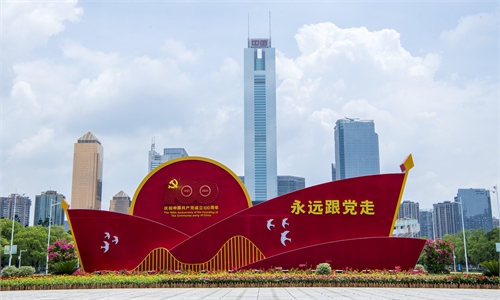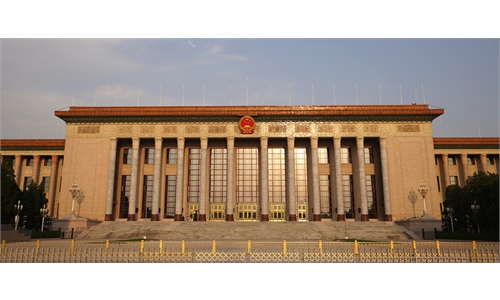Shaping history: A path of Chinese-style modernization creates new form of civilization
Editor's Note:
Who is the Communist Party of China (CPC)? What is the CPC's role in the new era?
The CPC has grown into one of the largest parties in the world in the process of leading the Chinese people in seeking liberation and happiness, making China as strong and prosperous as it is today.
As the CPC ushers the nation into a new era of development, the past decade has witnessed great achievements in national strength and prosperity, with the people's confidence and recognition of this path rising to unprecedentedly high levels.
With more than 96 million members, the CPC will convene its 20th National Congress in the second half of the year, which is expected to guide the country's development and policymaking. Ahead of the meeting, the Global Times is publishing a series of stories to help the world understand the CPC in the new era, through the stories of CPC members working on the frontlines of various fields, as well as through observations made by respected scholars.
This is the fifth installation of the series. Yang Guangbin, a distinguished professor at the Renmin University of China, illustrates how the CPC has deeply influenced world history.
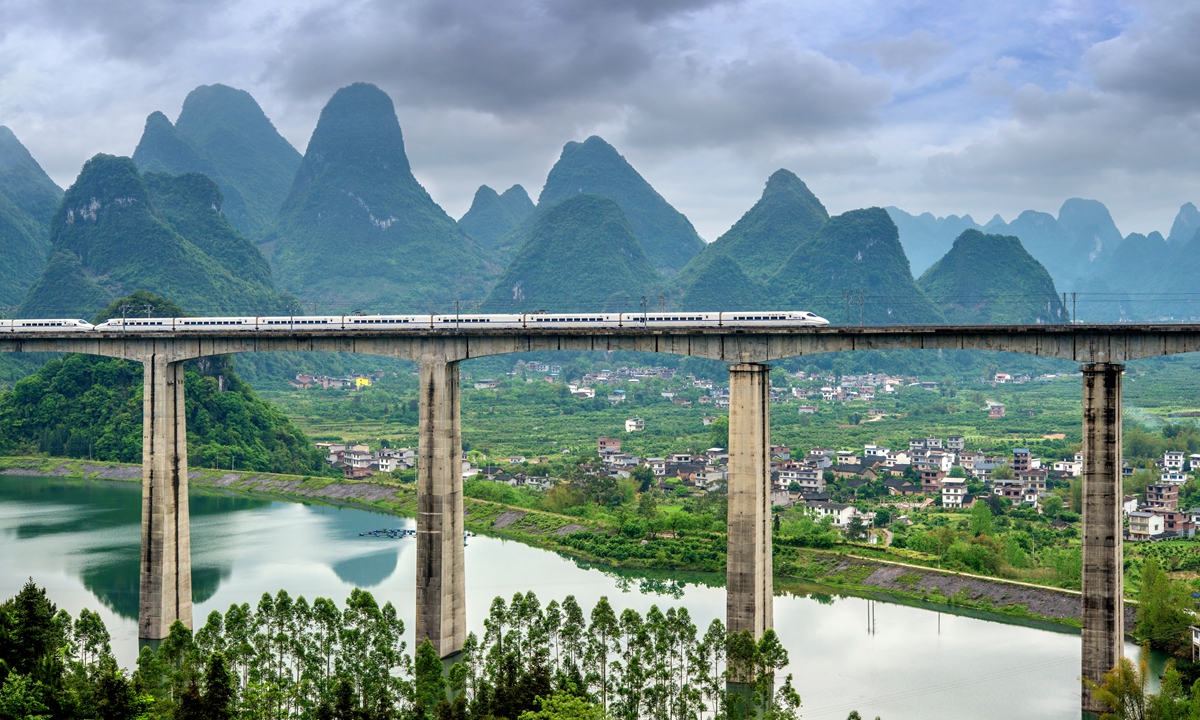
"The Party's endeavors over the past century have produced a profound influence on the course of world history," read the Resolution of the Central Committee of the Communist Party of China on the Major Achievements and Historical Experience of the Party over the Past Century, which was adopted at the Sixth Plenary Session of the 19th Central Committee of the CPC in November, 2021.
"The Party has led the people in pioneering a uniquely Chinese path to modernization, creating a new model for human advancement, and expanding the channels for developing countries to achieve modernization. This has offered a new option for countries and nations who want to accelerate development while preserving their independence," it read.
How has the CPC had such a profound influence on the course of world history?
Seeking liberation: Tearing apart the capitalist world system
The turn of the 19th and 20th centuries was the peak of European development, as well as the beginning of its decline. On the one hand, the two world wars exposed the internal crisis plaguing Western civilization, and also gave birth to the appearance of emerging countries and new systems, thus shaking Western civilization with the capitalist economic system as the core, which had dominated the world's political structures.
The decline of the West led to the reorganization of the global political structure. It is the result of a general crisis within the West. Moreover, the socialist movement born from the West's internal crisis, nationalism, and the October Revolution, the emergence of many socialist countries as well as subsequent national democratic liberation movements, fundamentally shook Western dominated world politics.
The CPC is the product of world politics in times of crisis, and it has also become a viable force to shake up the "imperialist world order." The reason is that, the ideological and organizational resources of the CPC are international.
In terms of ideological resources, the Communist Manifesto, which advocates for a global revolution, is the guiding ideology for the establishment of the CPC; in terms of organizational resources, the CPC was established with the direct help of Communist International. The anti-imperialism principle formed at the Second National Congress of the CPC in 1922 was also under the direction of Communist International. As a result of these collaborations, Mao Zedong emphasized that "the Chinese revolution was a part of the world proletarian revolution" during the Yan'an period.
The victory of the Chinese revolution must have decisive significance in world politics. First, it fundamentally changed the Asian order - previously, the US had used the Chiang Kai-shek's regime as its base to dominate its order in East Asia, but the victory of the Chinese revolution made the US turn to Japan.
Second, as a big country with a large population, China gaining the victory of revolution raised the strength and confidence of the socialist camp.
Third, the emergence of a New China has benchmark significance for national independence and liberation. In the 20 years after World War II, from South Asia, Southeast Asia to Africa, unprecedented national democratic liberation movements have emerged. Many emerging countries were born, most of which aim to establish a socialist system, although their names vary.
Seeking prosperity and strength: At a time of great changes unseen in a century
In the first 30 years of the People's Republic of China, not only were relatively complete national economic and industrial systems established, but also social construction that cannot be measured by GDP laid a solid social foundation for the subsequent reform and opening up.
Since the reform and opening up, Chinese people, with a spirit of practical rationality, soon made China the second largest economy in the world.
The changes brought about by reform and opening up in China are considered to be equivalent to the significance of the British Industrial Revolution. Because of China's profound civilization and super-scale, China has changed the world by changing itself.
At present, the once popular "universal value" is in a paradox, the principle of free trade is undercut by trade protectionism, freedom of speech is greatly undermined because of "political correctness," and the principle of equality encounters the principle of white supremacy. The confusion of values in turn leads to the failure of the international system. All of this stems from the frustration of "universal values" and the decline of US' ability to govern.
The domestic governance of the US is in great trouble. There are not only a survival crisis faced by the country's underprivileged white population caused by the hollowing-out of industry, but also the racism problem, as well the national problem of the impact of immigration caused by cultural pluralism.
The three problems, together, led to polarized politics in the US. The system of checks and balances has become a "veto system" between the two parties.
The political decline of a hegemonic country will inevitably lead to a major change in the international order, which is also the driving force behind the change.
When the real economy of the US was hollowed out, non-Western economies represented by China has risen. In 1840, non-Western countries accounted for 40 percent of global industrial manufacturing while the West accounted for 60 percent. From 1900 to 1980, non-Western countries only accounted for 10 percent of global industrial manufacturing while developed countries in the West accounted for 90 percent.
However, China's reform and opening up has fundamentally changed the West's dominant position. In 2010, non-Western countries accounted for 40 percent of global industrial manufacturing while the West's proportion has dropped to 60 percent. Moreover, the trend in favor of non-Western countries is still strengthening. The world has seemingly returned to the year of 1840. However, unlike 1840, when most Western countries had completed the first industrial revolution and non-Western countries did not even know what a train was, today non-Western countries are catching up in the process of learning. After WWII, the center of manufacturing shifted from developed countries to East Asia, and later from East Asia to the Chinese mainland.
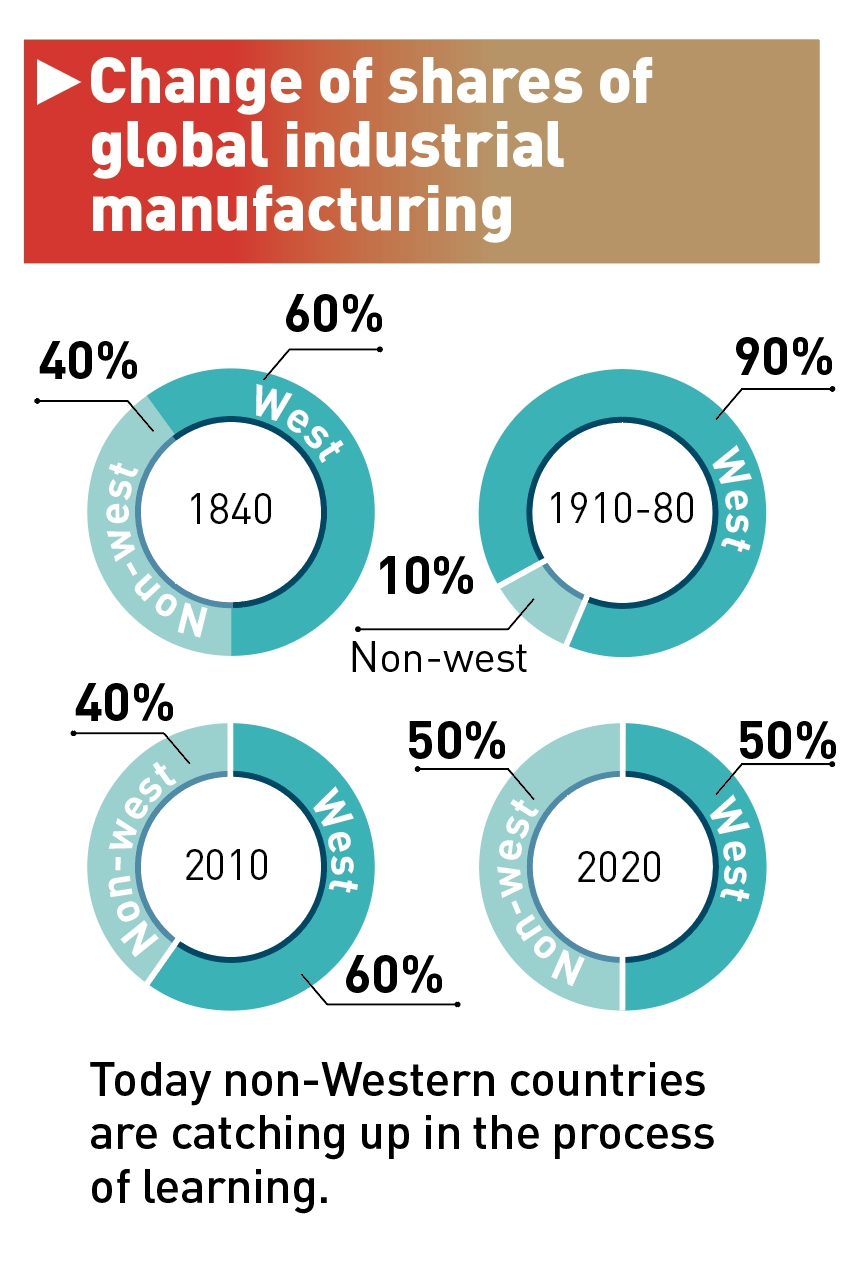
The transfer of wealth and power once again proves the general law of the decline of hegemonic countries - that from Spain to the UK to the US, the industrial economy turns from the real to the virtual. When Spain began to invest in "silver capital," its handicrafts industry declined and its neighboring countries such as France and Germany rose. At the end of the 19th century, British industry largely gave way to the US and Germany. This is the decline of hegemony caused by the transfer of wealth, which is irreversible.
It seems that, since WWII, the international order has not been as chaotic as it is now. On the one hand, the architect of the current international order has become the destroyer and troublemaker of the order, while other defenders of the traditional order, such as Germany and France, are too weak to maintain it. On the other hand, new political powers such as China and India that come of age in globalization have no intention of building a new alternative international order despite their dissatisfaction at the current order. What they pursue is to make the existing international order more diversified, more equal, and more just.
Where future world politics will go depends on the institutional provision capacity of new rising countries, just as the international order in the past was established by the UK and the US successively. The great changes unseen in a century due to the rise of China have demonstrated observable significance.
Changing international order
China's modernization path has created a new form of human civilization. In Francis Fukuyama's view, the Chinese path has become an alternative challenger to the Western model. In other words, the Chinese path, which has the genes of the Chinese civilization rather than the pursuit of liberalism in the West, has brought new elements of value to the international order. Instead of plundering by war, China has risen through peaceful development, which is fundamentally different from the way Western countries have risen and influenced the world.
For 300 years after the rise of the West, world politics was regarded as "anarchy," or a "quasi-war state" between countries, and the relationship between countries, and the relationship between people were like the primal relationship between wolves. This is the portrayal of Western international relations. No developed country in the West has developed without relying on war, colonization, and plunder. China's modernization path will go down in human history as a country that has profoundly influenced the course of world history and created a new form of human civilization.
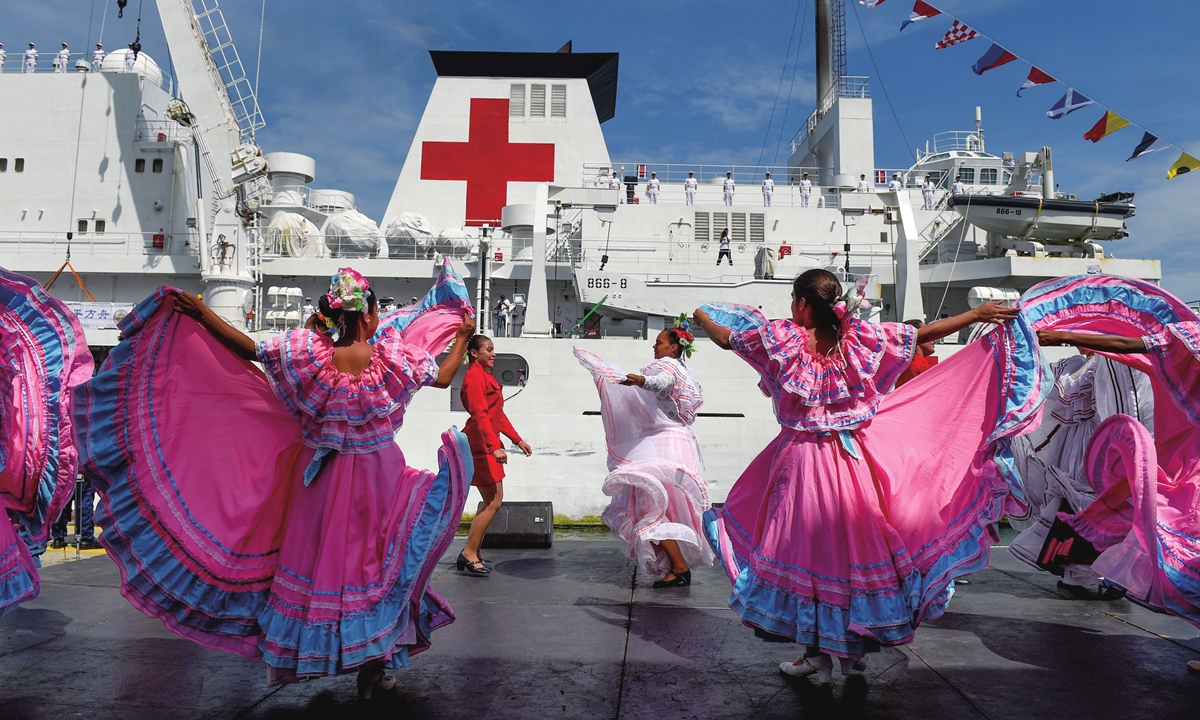
First, in terms of civilization, the rise of non-Western countries represented by China is changing the deep structure of world politics dominated by Western civilization formed over the past 300 years, and the non-Western civilization represented by outstanding Chinese traditional culture now plays an important role. In that regard, Western strategists such as Samuel Huntington have long put forward the "clash of civilizations" theory. However, the idea of universal harmony rooted in traditional Chinese culture is reflected in practice of building a community with a shared future for mankind featuring extensive consultation, joint contribution, and mutual benefit. It advocated peaceful coexistence of various civilizations. If the Western civilization pursues an imperial power order, the Chinese civilization advocates an order of harmonious coexistence. Different from the "clash of civilizations," Chinese people follow Confucius theory that, in wishing to establish oneself, an individual also seeks to establish others; and in wishing to enlarge oneself, the individual also seeks to enlarge others. Therefore, we are committed to the Belt and Road Initiative (BRI) to promote the common development of countries under the framework of the BRI, rather than practicing a winner takes all strategy.
Second, at the institutional level, the international order formed over the past 300 years to a large extent is dominated by capitalism. If developing countries followed the old path of developed countries, they would definitely become vassals of developed capitalist economies. The path of socialism with Chinese characteristics and its political system, while giving full play to the advantages of the whole nation system, have learned from the successful economic management experience of developed countries and they succeed in the globalization trend. China's experience offers "China's plan" and China's inspiration to developing countries that want to develop while maintaining their independence.
Third, at the geopolitical level, China's rise is bound to influence the East Asian order formed after WWII. China's role and centripetal force in the regional politics will definitely strengthen. China has always been a forerunner and just fell behind in the past 200 years. Now China has returned to its rightful place. So, Western countries should face this "new competitor" correctly.
China which adheres to the value of universal harmony that first played a pivotal role in changing an unequal capitalist world economic system through "seeking liberation" and then promoted the establishment of a more fair and just international order through "seeking prosperity" by reform and opening-up. It is obvious to all that China's adherence to and development of socialism with Chinese characteristics not only has created a new path of modernization with Chinese characteristics, but also has created a new form of human civilization.
Who is the Communist Party of China (CPC)? What is the CPC's role in the new era?
The CPC has grown into one of the largest parties in the world in the process of leading the Chinese people in seeking liberation and happiness, making China as strong and prosperous as it is today.
As the CPC ushers the nation into a new era of development, the past decade has witnessed great achievements in national strength and prosperity, with the people's confidence and recognition of this path rising to unprecedentedly high levels.
With more than 96 million members, the CPC will convene its 20th National Congress in the second half of the year, which is expected to guide the country's development and policymaking. Ahead of the meeting, the Global Times is publishing a series of stories to help the world understand the CPC in the new era, through the stories of CPC members working on the frontlines of various fields, as well as through observations made by respected scholars.
This is the fifth installation of the series. Yang Guangbin, a distinguished professor at the Renmin University of China, illustrates how the CPC has deeply influenced world history.

A bullet train passes through Yangshuo, Southwest China's Guangxi Zhuang Autonomous Region. Photo: IC
"The Party's endeavors over the past century have produced a profound influence on the course of world history," read the Resolution of the Central Committee of the Communist Party of China on the Major Achievements and Historical Experience of the Party over the Past Century, which was adopted at the Sixth Plenary Session of the 19th Central Committee of the CPC in November, 2021.
"The Party has led the people in pioneering a uniquely Chinese path to modernization, creating a new model for human advancement, and expanding the channels for developing countries to achieve modernization. This has offered a new option for countries and nations who want to accelerate development while preserving their independence," it read.
How has the CPC had such a profound influence on the course of world history?
Seeking liberation: Tearing apart the capitalist world system
The turn of the 19th and 20th centuries was the peak of European development, as well as the beginning of its decline. On the one hand, the two world wars exposed the internal crisis plaguing Western civilization, and also gave birth to the appearance of emerging countries and new systems, thus shaking Western civilization with the capitalist economic system as the core, which had dominated the world's political structures.
The decline of the West led to the reorganization of the global political structure. It is the result of a general crisis within the West. Moreover, the socialist movement born from the West's internal crisis, nationalism, and the October Revolution, the emergence of many socialist countries as well as subsequent national democratic liberation movements, fundamentally shook Western dominated world politics.
The CPC is the product of world politics in times of crisis, and it has also become a viable force to shake up the "imperialist world order." The reason is that, the ideological and organizational resources of the CPC are international.
In terms of ideological resources, the Communist Manifesto, which advocates for a global revolution, is the guiding ideology for the establishment of the CPC; in terms of organizational resources, the CPC was established with the direct help of Communist International. The anti-imperialism principle formed at the Second National Congress of the CPC in 1922 was also under the direction of Communist International. As a result of these collaborations, Mao Zedong emphasized that "the Chinese revolution was a part of the world proletarian revolution" during the Yan'an period.
The victory of the Chinese revolution must have decisive significance in world politics. First, it fundamentally changed the Asian order - previously, the US had used the Chiang Kai-shek's regime as its base to dominate its order in East Asia, but the victory of the Chinese revolution made the US turn to Japan.
Second, as a big country with a large population, China gaining the victory of revolution raised the strength and confidence of the socialist camp.
Third, the emergence of a New China has benchmark significance for national independence and liberation. In the 20 years after World War II, from South Asia, Southeast Asia to Africa, unprecedented national democratic liberation movements have emerged. Many emerging countries were born, most of which aim to establish a socialist system, although their names vary.
Seeking prosperity and strength: At a time of great changes unseen in a century
In the first 30 years of the People's Republic of China, not only were relatively complete national economic and industrial systems established, but also social construction that cannot be measured by GDP laid a solid social foundation for the subsequent reform and opening up.
Since the reform and opening up, Chinese people, with a spirit of practical rationality, soon made China the second largest economy in the world.
The changes brought about by reform and opening up in China are considered to be equivalent to the significance of the British Industrial Revolution. Because of China's profound civilization and super-scale, China has changed the world by changing itself.
At present, the once popular "universal value" is in a paradox, the principle of free trade is undercut by trade protectionism, freedom of speech is greatly undermined because of "political correctness," and the principle of equality encounters the principle of white supremacy. The confusion of values in turn leads to the failure of the international system. All of this stems from the frustration of "universal values" and the decline of US' ability to govern.
The domestic governance of the US is in great trouble. There are not only a survival crisis faced by the country's underprivileged white population caused by the hollowing-out of industry, but also the racism problem, as well the national problem of the impact of immigration caused by cultural pluralism.
The three problems, together, led to polarized politics in the US. The system of checks and balances has become a "veto system" between the two parties.
The political decline of a hegemonic country will inevitably lead to a major change in the international order, which is also the driving force behind the change.
When the real economy of the US was hollowed out, non-Western economies represented by China has risen. In 1840, non-Western countries accounted for 40 percent of global industrial manufacturing while the West accounted for 60 percent. From 1900 to 1980, non-Western countries only accounted for 10 percent of global industrial manufacturing while developed countries in the West accounted for 90 percent.
However, China's reform and opening up has fundamentally changed the West's dominant position. In 2010, non-Western countries accounted for 40 percent of global industrial manufacturing while the West's proportion has dropped to 60 percent. Moreover, the trend in favor of non-Western countries is still strengthening. The world has seemingly returned to the year of 1840. However, unlike 1840, when most Western countries had completed the first industrial revolution and non-Western countries did not even know what a train was, today non-Western countries are catching up in the process of learning. After WWII, the center of manufacturing shifted from developed countries to East Asia, and later from East Asia to the Chinese mainland.

GT
The transfer of wealth and power once again proves the general law of the decline of hegemonic countries - that from Spain to the UK to the US, the industrial economy turns from the real to the virtual. When Spain began to invest in "silver capital," its handicrafts industry declined and its neighboring countries such as France and Germany rose. At the end of the 19th century, British industry largely gave way to the US and Germany. This is the decline of hegemony caused by the transfer of wealth, which is irreversible.
It seems that, since WWII, the international order has not been as chaotic as it is now. On the one hand, the architect of the current international order has become the destroyer and troublemaker of the order, while other defenders of the traditional order, such as Germany and France, are too weak to maintain it. On the other hand, new political powers such as China and India that come of age in globalization have no intention of building a new alternative international order despite their dissatisfaction at the current order. What they pursue is to make the existing international order more diversified, more equal, and more just.
Where future world politics will go depends on the institutional provision capacity of new rising countries, just as the international order in the past was established by the UK and the US successively. The great changes unseen in a century due to the rise of China have demonstrated observable significance.
Changing international order
China's modernization path has created a new form of human civilization. In Francis Fukuyama's view, the Chinese path has become an alternative challenger to the Western model. In other words, the Chinese path, which has the genes of the Chinese civilization rather than the pursuit of liberalism in the West, has brought new elements of value to the international order. Instead of plundering by war, China has risen through peaceful development, which is fundamentally different from the way Western countries have risen and influenced the world.
For 300 years after the rise of the West, world politics was regarded as "anarchy," or a "quasi-war state" between countries, and the relationship between countries, and the relationship between people were like the primal relationship between wolves. This is the portrayal of Western international relations. No developed country in the West has developed without relying on war, colonization, and plunder. China's modernization path will go down in human history as a country that has profoundly influenced the course of world history and created a new form of human civilization.

Venezuelan dancers welcome the Chinese hospital ship Peace Ark upon its arrival at the port of La Guaira, Venezuela, on September 22, 2018. Photo:VCG
First, in terms of civilization, the rise of non-Western countries represented by China is changing the deep structure of world politics dominated by Western civilization formed over the past 300 years, and the non-Western civilization represented by outstanding Chinese traditional culture now plays an important role. In that regard, Western strategists such as Samuel Huntington have long put forward the "clash of civilizations" theory. However, the idea of universal harmony rooted in traditional Chinese culture is reflected in practice of building a community with a shared future for mankind featuring extensive consultation, joint contribution, and mutual benefit. It advocated peaceful coexistence of various civilizations. If the Western civilization pursues an imperial power order, the Chinese civilization advocates an order of harmonious coexistence. Different from the "clash of civilizations," Chinese people follow Confucius theory that, in wishing to establish oneself, an individual also seeks to establish others; and in wishing to enlarge oneself, the individual also seeks to enlarge others. Therefore, we are committed to the Belt and Road Initiative (BRI) to promote the common development of countries under the framework of the BRI, rather than practicing a winner takes all strategy.
Second, at the institutional level, the international order formed over the past 300 years to a large extent is dominated by capitalism. If developing countries followed the old path of developed countries, they would definitely become vassals of developed capitalist economies. The path of socialism with Chinese characteristics and its political system, while giving full play to the advantages of the whole nation system, have learned from the successful economic management experience of developed countries and they succeed in the globalization trend. China's experience offers "China's plan" and China's inspiration to developing countries that want to develop while maintaining their independence.
Third, at the geopolitical level, China's rise is bound to influence the East Asian order formed after WWII. China's role and centripetal force in the regional politics will definitely strengthen. China has always been a forerunner and just fell behind in the past 200 years. Now China has returned to its rightful place. So, Western countries should face this "new competitor" correctly.
China which adheres to the value of universal harmony that first played a pivotal role in changing an unequal capitalist world economic system through "seeking liberation" and then promoted the establishment of a more fair and just international order through "seeking prosperity" by reform and opening-up. It is obvious to all that China's adherence to and development of socialism with Chinese characteristics not only has created a new path of modernization with Chinese characteristics, but also has created a new form of human civilization.
